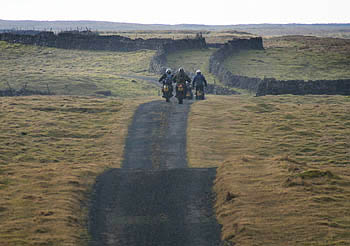 Yorkshire Dales authorities could restrict motor traffic on several green lanes in its area, to protect them from damage caused by 4×4s and bikers.
Yorkshire Dales authorities could restrict motor traffic on several green lanes in its area, to protect them from damage caused by 4×4s and bikers.
The national park is starting consultation this week on plans to impose curbs on the use of recreational vehicles on eight of its unsurfaced tracks. The eight have been whittled down from more than 100 potential routes across the area.
Motorcyclists on Cam High Road
The Natural Environment and Rural Communities Act allows local authorities to introduce traffic regulation orders (TROs) to limit the use of such routes by cars, all-terrain vehicles and motorbikes.
Seven temporary traffic regulation orders are already in place in the Yorkshire Dales, with one further permanent one. The park authority will start consultation on Friday with other interested parties.
Jon Avison, the Yorkshire Dales National Park Authority’s (YDNPA) head of park management, said: “The orders are being proposed for the purposes of preserving and conserving the benefits and the natural beauty of the areas through which these routes pass.
“A first round of consultation with land owners, parish councils and some other organisations has already taken place and the decision of the YDNPA’s access committee last month (January) was that the second round – which will enable other groups and individuals to comment – should begin.
“The comments received will be considered by the Committee and a decision on whether or not to make the TROs will then be made.”
The routes which would be affected by the proposed orders are:
- Gorbeck Road and Stockdale Lane between Settle and Malhamdale
- Foxup road between Horton-in-Ribblesdale and Foxup
- Cam High Road between Far Gearstones and Cam Houses and a connecting route to Old Ings
- Street Gate near Malham Tarn to Arncliffe Cote
- Harber Scar Lane between Horton-in-Ribblesdale and High Green Field
- The High Way between Cotterdale and Hell Gill Bridge.
Initially, 28 routes were identified as potentially highly sensitive to recreational motor vehicle use. Fifteen were looked at in detail and it was proposed that eight of them could be made the subject of TROs.
John Belbin
06 February 2008About time too. The damage done to these roads (not to mention the noise and hassle caused to walkers) is absolutely incredible and, as soon as any repairs are done, the grooves are worn again within an incredibly short time.
Alastair Hornby
07 February 2008I disagree, these road are exactly that ROADS and as such should be open to all users to enjoy. Most date back hundreds of years and are old drove roads used to get live stock to markets. Why should they be shut to motor vehicles allowing only walkers and horse riders the enjoyment????